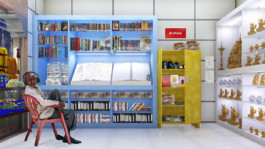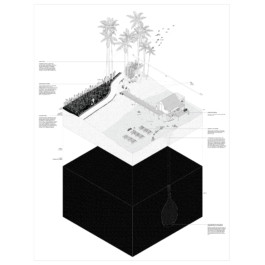Material Subjects, 2022
▣ TYPE: Postgraduate design studio
▨ INSTITUTION: The Architectural Association
▤ KEY MATERIALS: Timber / Adobe / Stone / Oil / Tumeric
▦ METHODOLOGY: Model Making / 1:1 Testing / System Design / Drawing
▥ COLLABORATORS: George Massoud / Merve Anil / Lina Ashour
If we are all subjects of our material environments, then it follows that a particular material regime forms its own distinct ‘subjecthood’. The machinery of 21st-century capitalism is an extractive circuit which traverses the Earth’s surface through global supply chains and physical infrastructures, connecting the economically and ecologically dispossessed global South with the imperial metropoles of the global North. Our ambitions for the year were twofold: to trace the mechanisms of this extractive circuit from its colonial roots to the present day, and to utilise our skill-sets as spatial practitioners to design tactics of resistance, means of commoning knowledge and resources, and speculations of emancipatory futures.
Extractive mega-projects are central to maintaining racial capitalism in the global South, destroying geographies through the dispossession and enslavement of its indigenous people. The unit will understand racism and colonialism as material phenomena that imprint on our bodies and shape our subjectivities. We will examine the violence of reducing, constraining and converting life into commodities and systems, and ask how materials mediate relationships between states and their citizens. How do these relationships change through extraction? How does land become commodity and human become labour?
Using a decolonial methodology, we will trace racialised and gendered cartographies of dispossession, enclosure, extraction, production, logistics and environmental degradation. Our skills as architects will be developed in order to quantify and qualify material processes and the power relations behind them. We will deconstruct material life cycles and devise new units of measurement, alternative institutions and infra-structures of resistance. Our projects will expose and hold to account existing extractive practices, and will learn from queer and feminist theory to propose alternative social ecologies that challenge patriarchal logics and monocultures. The unit will be a launchpad from which to under-stand sites of power, control and resistance by bringing spatial, legal, economic and political modes of indigenous erasure to light.
STUDENTS: Alifiyah Jariwala, Anna Simmen, Aude Tollo, Kamal El Kharrat, Laetitia Chauveau, Madeleine Griffiths, Mehr Liaqat, Nethra Ganesan, Vian Rasool and Zi Ming Ting
Material Subjects, 2022
▣ TYPE: Postgraduate design studio
▨ INSTITUTION: The Architectural Association
▤ KEY MATERIALS: Timber / Adobe / Stone / Oil / Tumeric
▦ METHODOLOGY: Model Making / 1:1 Testing / System Design / Drawing
▥ COLLABORATORS: George Massoud / Merve Anil / Lina Ashour
If we are all subjects of our material environments, then it follows that a particular material regime forms its own distinct ‘subjecthood’. The machinery of 21st-century capitalism is an extractive circuit which traverses the Earth’s surface through global supply chains and physical infrastructures, connecting the economically and ecologically dispossessed global South with the imperial metropoles of the global North. Our ambitions for the year were twofold: to trace the mechanisms of this extractive circuit from its colonial roots to the present day, and to utilise our skill-sets as spatial practitioners to design tactics of resistance, means of commoning knowledge and resources, and speculations of emancipatory futures.
Extractive mega-projects are central to maintaining racial capitalism in the global South, destroying geographies through the dispossession and enslavement of its indigenous people. The unit will understand racism and colonialism as material phenomena that imprint on our bodies and shape our subjectivities. We will examine the violence of reducing, constraining and converting life into commodities and systems, and ask how materials mediate relationships between states and their citizens. How do these relationships change through extraction? How does land become commodity and human become labour?
Using a decolonial methodology, we will trace racialised and gendered cartographies of dispossession, enclosure, extraction, production, logistics and environmental degradation. Our skills as architects will be developed in order to quantify and qualify material processes and the power relations behind them. We will deconstruct material life cycles and devise new units of measurement, alternative institutions and infra-structures of resistance. Our projects will expose and hold to account existing extractive practices, and will learn from queer and feminist theory to propose alternative social ecologies that challenge patriarchal logics and monocultures. The unit will be a launchpad from which to under-stand sites of power, control and resistance by bringing spatial, legal, economic and political modes of indigenous erasure to light.
STUDENTS: Alifiyah Jariwala, Anna Simmen, Aude Tollo, Kamal El Kharrat, Laetitia Chauveau, Madeleine Griffiths, Mehr Liaqat, Nethra Ganesan, Vian Rasool and Zi Ming Ting
E info@materialcultures.org
T 07707592097
E info@materialcultures.org
T 02030626832




















